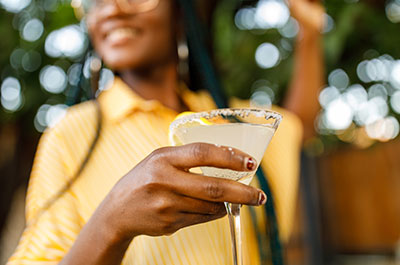While it’s no secret that alcohol isn’t good for you, it’s long been thought that a few drinks per week won’t hurt. But new research doubles down on the link between alcohol and cancer – and shows that it’s not just binge drinking that increases your cancer risk.
“One drink per day for women and two drinks per day for men used to be considered moderate drinking that wouldn’t likely increase your risk for cancer,” says Dawn Severson, M.D., a medical oncologist at Henry Ford Health. “But recently, the World Health Organization (WHO) stated no amount of alcohol consumption is safe. On top of that, a new United States Surgeon General Advisory says less than one drink per day can increase your risk for certain cancers.”
The Advisory states that alcohol contributes to nearly 100,000 cancer cases and about 20,000 cancer deaths in the United States each year. After tobacco and obesity, alcohol is the third leading preventable cause of cancer in the United States. Because of this, the Surgeon General says there should be cancer warning labels on alcohol.
How Does Drinking Alcohol Contribute To Cancer?
There are a few ways alcohol increases your cancer risk:
- Alcohol damages body tissue, so it puts the body in a state of repair: cells must quickly divide to heal itself. “The more times your body is forced to repair itself, the more likely it is that something will go awry in the healing process,” says Dr. Severson. “Chances are higher that when your cells are made to divide more frequently to overcome damage, they will divide abnormally, and this increases the risk of forming a tumor.”
- When alcohol is broken down by the liver, one of the molecules that it’s broken down to is a toxic, carcinogenic compound called acetaldehyde. “Acetaldehyde can damage DNA, which is the genetic material that our body needs to function properly,” says Dr. Severson.
- Alcohol impairs the body’s ability to break down nutrients, leading to malabsorption. “Folic acid, vitamins E, A, and C, the B vitamins—all of these nutrients are necessary for healthy cells,” says Dr. Severson. “If the body is deficient, it can lead to stress on the cells and further damage, possibly creating cell abnormalities and leading to cancer,” says Dr. Severson.
What Cancers Are Associated with Alcohol Use?
Certain cancers have been shown to be related to alcohol consumption:

Know Your Cancer Risk
- Liver cancer. “Alcohol kills liver cells and this leads to cirrhosis, or scarring of the liver,” says Dr. Severson. “The liver is constantly attempting to overcome alcohol-related damage, and that is how cancer cells can develop.”
- Aerodigestive tract cancers, such as head, neck and esophageal cancers. The risk for esophageal cancer is further increased if someone has a genetic enzyme deficiency, which interferes with their ability to metabolize alcohol well. “However, many people don’t even know they have this enzyme deficiency,” says Dr. Severson.
- Breast cancer. “Alcohol can increase estrogen levels in women, and increased estrogen is associated with a higher breast cancer risk,” says Dr. Severson. For breast, mouth and throat cancers, evidence shows one or fewer drinks per day can lead to an increased cancer risk.
- Colorectal cancer. Young people (those under age 50) are being diagnosed more frequently with colorectal cancer, and it’s thought that alcohol, along with obesity, may be to blame.
If You Stop Drinking Alcohol, Can You Reverse Your Cancer Risk?
Abstaining from alcohol can reduce your risk of developing an alcohol-related cancer. “You can’t bring your risk down to zero – especially if you were a heavy drinker in the past – but by significantly cutting down or abstaining, you can lower your risk from what it would have been when you were drinking,” says Dr. Severson.
The best way to cut out alcohol? Go slowly. Cutting out alcohol all at once, for many people, might not lead to a permanent lifestyle change. For example: Instead of meeting friends for drinks, get together for coffee. Or have the bartender try a fun mocktail recipe. Having a get together at a friend’s house? Bring your favorite non-alcoholic drinks and snacks so you feel less tempted. Looking to crack open a bottle of wine after a stressful day? Pour a cup of tea and open a good book. Making little changes, one by one, is the way to make new behaviors last.
Reviewed by Dawn Severson, M.D., a board-certified medical oncologist who sees patients at Henry Ford Cancer – Hayes Rd and Henry Ford Macomb Hospital.



